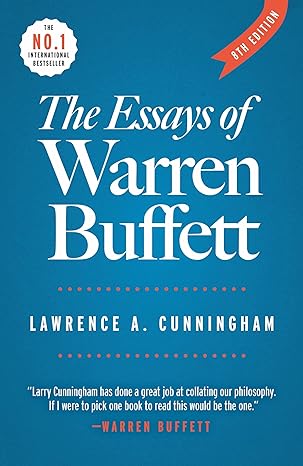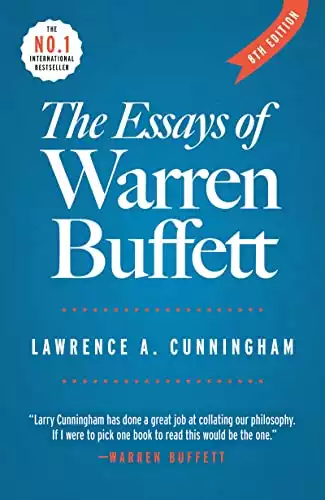Overview : The Essays of Warren Buffett
-
Book Title: The Essays of Warren Buffett: Lessons for Corporate America
-
Author: Warren E. Buffett, compiled by Lawrence A. Cunningham
-
Publication Date: 1997 (First Edition)
-
Rating: 5
-
price: $26.09
-
Pages: 315
About the Author
The author of The Essays of Warren Buffett, Lawrence A. Cunningham, is a renowned professor and corporate governance expert. He masterfully curates Warren Buffett's wisdom, making it accessible to investors and business professionals alike, offering valuable insights into Buffett's philosophies on investment and management.
Introduction to The Essays of Warren Buffett Book
In the ever-evolving world of finance and investing, few voices carry as much weight as that of Warren Buffett. "The Essays of Warren Buffett: Lessons for Corporate America" offers readers an unparalleled glimpse into the mind of this legendary investor. Compiled and skillfully edited by Lawrence A. Cunningham, this collection distills decades of Buffett's insights from his annual letters to Berkshire Hathaway shareholders.
As we navigate the complexities of modern investing, from traditional markets to emerging trends in cryptocurrencies, Buffett's principles remain a beacon of clarity and wisdom. This review will explore how his timeless advice applies to today's financial landscape, including personal finance strategies and market analysis.
The Essays of Warren Buffett Book Summary
At its core, "The Essays of Warren Buffett" is a masterclass in value investing, a strategy Buffett learned from his mentor Benjamin Graham. The book covers a wide range of topics, including:
- The principles of value investing
- Corporate governance and ethics
- Risk management and diversification
- The importance of patience in investing
- The role of shareholders and managers
- Mergers and acquisitions
- Building a strong corporate culture
Buffett's essays provide invaluable insights for both novice investors looking to build their personal finance knowledge and seasoned professionals seeking to refine their market strategies.
Analysis of Themes: From Wall Street to Main Street
Value Investing in a Volatile Market
In an era of high-frequency trading and market volatility, Buffett's emphasis on intrinsic value stands out. He advises investors to look beyond short-term market fluctuations and focus on the underlying business fundamentals. This approach is particularly relevant in today's market, where trends like cryptocurrencies and meme stocks can create significant price swings.
"Price is what you pay. Value is what you get." - Warren Buffett
Corporate Governance in the 21st Century
Buffett's essays on corporate governance are more relevant than ever considering recent corporate scandals and the growing emphasis on ESG (Environmental, Social, and Governance) factors. His call for transparency and accountability resonates with the current push for more ethical business practices in the banking and finance sectors.
The Long Game: Patience in Investing
In a world of instant gratification, Buffett's emphasis on long-term investing is both contrarian and crucial. His famous quote, "The stock market is designed to transfer money from the Active to the Patient," serves as a reminder that sustainable wealth creation often requires time and discipline.
Writing Style: Clarity Meets Wit
One of the book's greatest strengths is Buffett's ability to explain complex financial concepts in accessible language. His use of analogies and anecdotes makes the essays engaging and memorable, allowing readers to grasp intricate ideas without getting lost in financial jargon.
Strengths and Weaknesses of The Essays of Warren Buffett
Strengths:
- Timeless investment principles applicable across market cycles
- Clear, engaging writing style
- Comprehensive coverage of both investing and corporate management
- Ethical framework for business decision-making
Weaknesses:
- Limited coverage of modern financial instruments (e.g., cryptocurrencies)
- Some concepts may require additional context for complete beginners
- Focus primarily on U.S. markets, with less emphasis on global investing
Related Books to The Essays of Warren Buffett
While books like "The Intelligent Investor" by Benjamin Graham provide the theoretical foundation of value investing, "The Essays of Warren Buffett" offers a more practical and modern application of these principles. Compared to contemporary works like "A Random Walk Down Wall Street" by Burton Malkiel, Buffett's essays offer a more active approach to investing, emphasizing fundamental analysis over passive index investing.
Highlights from The Essays of Warren Buffett by Warren Buffett
Long-Term Investment: Buffett advocates for a patient, long-term approach, focusing on businesses with enduring value.
Value Investing: Emphasizes buying undervalued companies with strong fundamentals rather than chasing short-term market trends.
Quality Management: Invest in companies with trustworthy, capable management that aligns with shareholder interests.
Avoiding Debt: Buffett cautions against excessive leverage, preferring companies with low debt and strong financial health.
Owner’s Mindset: Approach investing as a business owner, assessing intrinsic value and the company's future.
Consistent Principles: Highlights sticking to core investing principles, regardless of market fluctuations and external pressures.
Conclusion: An Essential Read for the Modern Investor
"The Essays of Warren Buffett: Lessons for Corporate America" is an indispensable resource for anyone serious about investing and business management. Its principles transcend market trends, offering a solid foundation for navigating the complexities of modern finance. Whether you're building a personal investment strategy or leading a corporation, Buffett's insights provide a moral and practical compass.
In an age where financial advice is abundant but often conflicting, Buffett's essays stand out for their consistency, clarity, and proven track record. This book not only teaches you how to invest but also how to think about investing – a skill that's invaluable in today's rapidly changing financial landscape.
For those looking to deepen their understanding of value investing and corporate ethics, "The Essays of Warren Buffett" is an essential addition to your financial library. It's a book that rewards repeated reading, offering new insights with each pass.





